Ata-ul-Haye Nasir, Ahmadiyya Archive & Research Centre
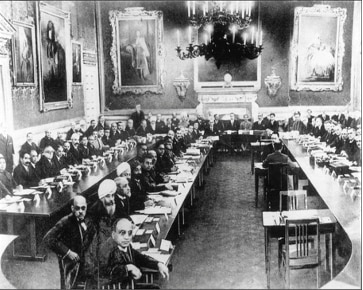
The late 1920s witnessed huge political turmoil and uncertainty in British India, and when the Simon Commission published its two-volume report in 1930, the British government called a series of conferences to discuss the future of India. The Viceroy of India had stated that the solution for India’s political problems would heavily rely on the Simon Commission’s report.
When the First Round Table Conference was announced to be held from November 1930 to January 1931, Hazrat Musleh-e-Maudra wrote an article on 23 June 1930, just a night before the publication of the second volume of the Simon Commission Report. In this article, Huzoorra gave valuable guidance to the British government and Indian Muslims. Huzoorra then wrote another article to be sent to England for the conference, in which he gave detailed analysis on the Simon Commission Report, and presented his view of what step the British government should take going forward.
Before going into the details of these two articles, it is important to give a short background of the Simon Commission.
Under the Montagu-Chelmsford Reform Scheme of 1918, the British government had decided that after ten years, a commission would be sent to India to examine the effects and operations of the constitutional reforms and to suggest more reforms for India. Towards the end of 1927, a commission was announced to be sent whose president was Sir John Allsebrook Simon. This is known as “The Indian Statutory Commission” or “Simon Commission”.
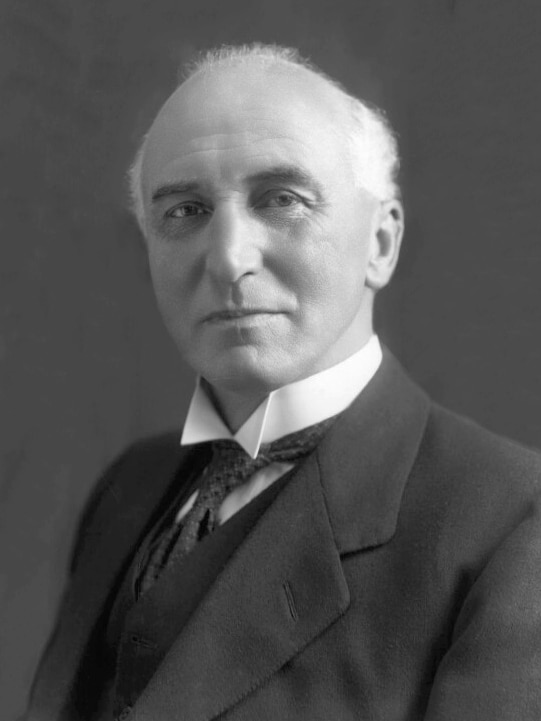
As the commission had no Indian member, Congress and other political parties boycotted it. Even some prominent Muslim leaders like Muhammad Ali Jinnah and Muhammad Ali Jauhar held the same opinion.
On this, Hazrat Musleh-e-Maudra wrote a booklet on 8 December 1927, titled Musalmanan-e-Hind Ke Imtehan Ka Waqt (A Time of Trial for the Indian Muslims), wherein he advised Muslims that the boycott would be more detrimental for Muslims, compared to the Hindus.

Huzoorra said that since the Reform Scheme had been approved, Hindu leaders knew that India’s future was linked to the British; thus, they often visited England to meet with prominent Englishmen and speak about Hindu interests. Huzoorra said that they had won the British over and convinced them of their views. But the Muslims had not paid any attention towards this matter.
Huzoorra added that if the commission was boycotted, then its report would be based on the previous information provided to them by the Hindus – which would not be entirely accurate. For this reason it was essential that Muslims had an input and not boycott the commission. (Musalmanan-e-Hind ke Imtehan ka Waqt, Anwar-ul-Ulum, Vol. 10, pp. 37-55)
The Englishman reported:
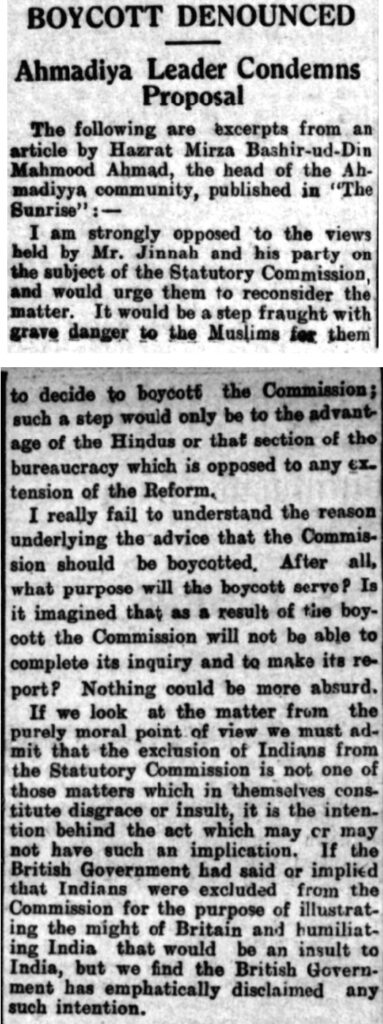
“Boycott Denounced
“Ahmadiya Leader Condemns Proposal
“The following are excerpts from an article by Hazrat Mirza Bashir-ud-Din Mahmood Ahmed, the head of the Ahmadiyya community, published in The Sunrise:
“‘I am strongly opposed to the views held by Mr Jinnah and his party on the subject of the Statutory Commission, and would urge them to reconsider the matter. It would be a step fraught with grave danger to the Muslims for them to decide to boycott the commission; such a step would only be to the advantage of the Hindus or that section of the bureaucracy which is opposed to any extension of the Reform.
“‘I really fail to understand the reason underlying the advice that the Commission should be boycotted. After all, what purpose will the boycott serve? Is it imagined that, as a result of the boycott the Commission will not be able to complete its inquiry and to make its report? Nothing could be more absurd.
“‘If we look at the matter from the purely moral point of view we must admit that the exclusion of Indians from the Statutory Commission is not one of those matters which in themselves constitute disgrace or Insult, it is the intention behind the act which may or may not have such an implication. lf the British Government had said or implied that Indians were excluded from the Commission for the purpose of illustrating the might of Britain and humiliating India that would be an insult to India, but we find the British Government has emphatically disclaimed any such intention.’” (The Englishman, 5 January 1928, p. 18)
In March 1928, an Ahmadiyya deputation met with the members of the Simon Commission. The Civil and Military Gazette reported:

“Sir John Simon Returns
“A Busy Day in Lahore.
“Sir John Simon and other members of the Statutory Commission who have been on a tour of the district returned to Lahore on Wednesday.
“They spent nearly the whole of the day receiving deputations from the martial classes, the Ahmediya Community, the Punjab Chief’s Association, the Ram Garhia Central Board, the European Association, the Punjab Trade Association, the Democratic National League, and the depressed classes.” (The Civil and Military Gazette, 23 March 1928, p. 6)
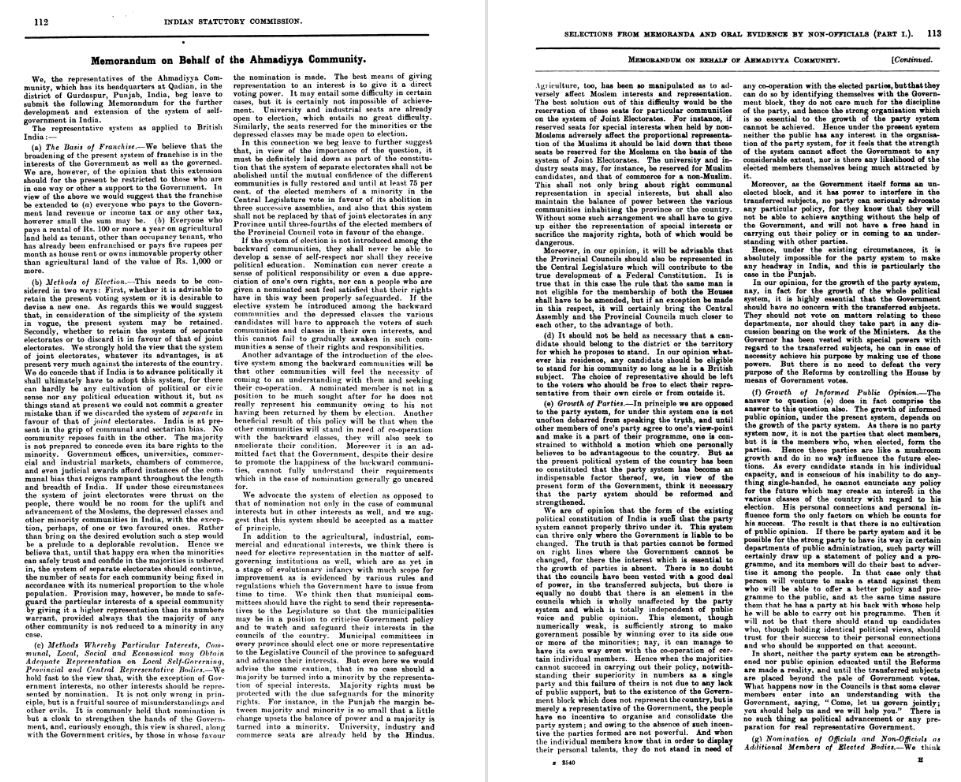
On 11 February 1929, The Manchester Guardian reported:
“The Ahmadiyya community, which has its headquarters in Qadian, in the Punjab, is not usually regarded as concerning itself with political questions, but a memorandum has been presented to the Statutory Commission Reforms in India on behalf of the head of the Ahmadiyya community.
“It has just been explained to me by the Imam of the London mosque, Moulvi Farzand Ali, that this interest in political matters has been forced upon the Khalifat-ul-Masih, as the head of the movement is called, for the desires and interests of the Mussulmans in India were, in the opinion of the Ahmadis, being misrepresented. […]
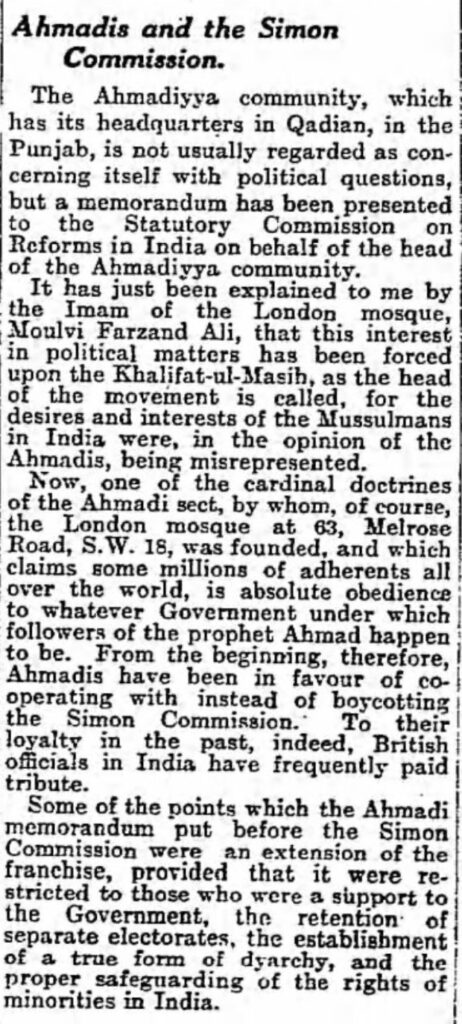
“Some of the points which the Ahmadi memorandum put before the Simon Commission were an extension of the franchise, provided that it were restricted to those who were a support to the Government, the retention of separate electorates, the establishment of a true form of dyarchy, and the proper safeguarding of the rights of minorities in India.”
The Muslim members of the Simon Commission’s Punjab Committee had agreed on the suggestion that the Punjab Council should have 83 Muslim members out of the total 165, though Muslims deserved a 55% share. Huzoorra wrote an article in which he expressed his concerns over this agreement. This article was published in Al Fazl, 30 August 1929.

In May 1930, the Simon Commission had published the first volume of its report, and the second volume was expected to be published towards the end of June 1930. While there were several speculations going on, Huzoorra wrote an article titled Gol Maiz Conference Aur Musalmanon Ki Numaindgi on 23 June 1930, in which he said:
“I am writing this article on the night between Monday [23 June] and Tuesday [24 June]. By this time, the newspapers would have received the second volume of the Simon Commission Report. […] There is only one night in between, but this is such a delicate matter that I do not consider it right to wait for even one night. By the time my article will reach the people, the report would have been published, and possibly an uproar would have erupted within the country.
“But I say that even if the [second volume of the] Simon Commission Report is against us [Muslims], we must understand that the reason behind the demand for the round table conference was that in view of the people of India, the report of this commission was not acceptable as per the country’s perspective. So if the [second volume of the] report is against our expectations, then it will only endorse the viewpoint of the people of India […].” (Gol Maiz Conference Aur Musalmanon Ki Numaindgi, Al Fazl, 28 June 1930, p. 3)

Huzoorra said that in case the second volume of the report was against the expectations, it would actually increase the importance of the Round Table Conference.
Huzoorra added that in such a situation, the need for the correct representation of Muslims increased more than ever before, because if our viewpoint is not presented correctly and the decision goes against us, then nothing would remain in the hand of Muslims. Huzoorra also advised the Muslims to be united in the ongoing situation.
Huzoorra advised the government that the people of India should be given the right of selecting their representatives for this conference, instead of the government itself choosing. He then suggested a formula as to how the representatives should be selected from India.
Further, Huzoorra stated that this was the time for “All Muslim Parties Conference” to play its role.
After this article, Hazrat Musleh-e-Maudra wrote another article titled Hindustan Ke Maujuda Siyasi Masla Ka Hal (The Solution to the Political Problems of India) and sent it to England for the First Round Table Conference. In this article, a detailed analysis of the Simon Commission’s report was presented, and the validity of the Muslims’ demands and rights was addressed.

In its preface, Huzoorra wrote:
“In view of the present state of affairs in India as well as in England it is certainly no easy task to write and publish a review of the report submitted by the Simon Commission to His Majesty’s Government in England.
“On the one hand a section of the Indian people is condemning it as being most reactionary and an insult to the political aspirations of the country, while on the other a portion of the British people look upon it as but a leap in the dark. There is an atmosphere of tense excitement. The youth of India is indulging in happy dreams of a free motherland, whereas the veteran politician of England counsels a course of slowness and caution. If the one is looking upon the other as an irritating hindrance in the way of his freedom the other considers the former to be pursuing a course of sheer madness and folly. Such [an] atmosphere is certainly not favourable for the giving and taking of advice though obviously it is the one when it is most needed. When acute and deep-rooted prejudices are at work human understanding naturally becomes dim and short sighted and under such circumstances one often fails to listen to, and recognise the reasonableness of the best of advice. A perfectly good thing begins to appear as something positively bad and harmful and a well-wisher is looked upon as an enemy.
“This state of affairs, however, cannot prevent me from offering my advice which is rather all the more needed in times of such tension and mutual mistrust. It is indeed a painful sight that on both sides there is a little tendency to find out and face the truth and the hearts of the people are full of malice and ill-will. The Indians generally look upon every thing that emanates from the British as being based on deceitfulness and political manoeuvring while the English people generally look upon the Indian political leaders as mere hunters of fame and leadership and disturbers of peace. Being a religious person I am not so much connected with politics as are those who may be called professional politicians but my religion makes it all the more obligatory on me to work for peace and goodwill. My being unconnected with politics, perhaps also imparts to me a sense of impartiality which enables me to look at things more dispassionately than those who are actually taking part in the struggle on one side or the other. In view, therefore, of the coming Round Table Conference I have thought it advisable to express my views on the recommendations of the Simon Commission and other matters connected with the present political problem of India and I hope that the unbiased and independent thinkers of both the countries will give my suggestions a dispassionate and sympathetic consideration.” (Some Suggestions for the Solution of the Indian Problem [1930], pp. 1-3)
While addressing the British government’s officers, Huzoorra said that they had a huge responsibility, and God Almighty had given them an amanat – duty – which they needed to fulfil in the best manner.
Huzoorra said:
“Before entering upon the subject proper I would like to give a word of advice to the British officials here as well as in England who are responsible for the good government of India. I would say to them, on you devolves a most heavy responsibility in connection with India. God has entrusted you with a sacred trust and you are now bound in duty to discharge that trust rightly and faithfully. The present day materialism of the world has immensely weakened faith in God and even those who claim to believe in a Supreme Being, regard Him to be a mere looker-on who takes no interest in the affairs of this world. But this is not true; for if such had been the case, God would never have cared to send prophet after prophet for the guidance of mankind. Is there a people in the world that has not received a messenger from God? Human intellect spurns the idea that the Maker of the universe should be satisfied to remain an uninterested looker-on and do nothing for the welfare of those whom He has created. You may laugh at me and think me to be a foolish and superstitious person for introducing religion and God in politics but the truth remains that a day shall come when everybody will be called to account before Him. There are many who ignore the existence of God in this life but death brings with it moments of sorrow and grief.
“You should not therefore forget the heavy responsibility which you owe to India and of which you shall one day be called upon to render an account before the August Presence of Our Creator. India is a most sacred trust in your hands; so let not the petty interests of your country and nation prevent you from discharging that trust honestly and faithfully. I have used the word ‘petty’ advisedly not because I hold your country and your interests in light esteem but because every worldly gain and worldly interest, however great it may be, is petty and insignificant when compared, from the moral and spiritual point of view, with the question of the rightful freedom of even a single individual. If you act justly and faithfully in this matter then, even if some of your countrymen may now rail against you and call you traitors, the day will surely come when not only your own children but all the world will remember you with honour and the future generation will bow down their heads with reverence at the mention of your names.” (Ibid., pp. 4-5)
While advising the people of India, Hazrat Musleh-e-Maudra stated:
“Similarly I would say to the people of India, my countrymen! Purge your hearts of all prejudices and feelings of malice and ill-will, for though these feelings apparently taste sweet and honeyed at this time they are in reality very bitter and harmful. The course of our history clearly indicates that the time of India’s freedom has come. God Almighty is infusing a new spirit in our hearts. Behind the thick veil of dark clouds silvery streaks of lightening are making themselves visible, and though every interval of darkness may appear darker and more threatening than its predecessor; the light is also gaining more and more intensity at every new flash, holding out sure promises of coming happiness. So my dear countrymen do not exchange mercy of God for His wrath by cherishing hatred and enmity in your hearts, nor barter His beneficence for His curse, for God loves not those who are obdurate and stiff-necked and who do not cheerfully accept the truth. It may be impalatable to you now but it is a fact that whatever be the motive of the British in holding India their presence in this country is in some ways a boon from God for if we have lost something under their rule is it not an undeniable truth that we have also gained a good deal? […] The nationalist movement which is surely though slowly welding the various heterogeneous elements of the country into one harmonious whole is also mainly attributable to British influence. Again respect for law and an effort to administer justice without fear and favour at least in cases in which the parties are Indian is yet another feature of the present regime. So let us not shut our eyes to their virtues in our dislike for their weaknesses. He who rejects one truth often finds himself in a position where he is forced to reject the other. The nation whom God has made a means of our awakening should not receive an ignoble treatment at our hands. We should not embitter the last moments of our final decision with that nation and thereby give rise to a new and world-wide conflagration. If injustice is bad in an Englishman, it should be equally so in an Indian. I would, therefore, advise you, my dear countrymen, to exercise self-control and moderation and to seek to win your goal with love and kindliness, so that the hearts of the people may be purged of all malice and rancour and foundations of a state may be laid in a way that may usher a new era of love, unity, and concord.” (Ibid., pp. 6-7)
Huzoorra said that undoubtedly during the Round Table Conference, the Simon Commission’s report would get the most importance, and the same report would influence the views of the representatives. This report was not that bad as depicted in the print media, and after reading it closely, one finds that there were many good aspects and bad ones too.
Huzoorra addressed a point in the Simon Commission’s report which said that a Western-style constitution or the concept of responsible government couldn’t be implemented in India. Huzoorra stated that it was true that India couldn’t completely copy the English constitution, but it could form a new system in light of that constitution as per its needs.
Huzoorra spoke about the speech of Edwin Samuel Montagu, Secretary of State for India, delivered on 20 August 1917, in the House of Commons, in which he said:
“The policy of His Majesty’s Government […] is that of […] gradual development of self-governing institutions with a view to the progressive realisation of responsible government in India as an integral part of the British Empire.” (House of Commons Debates, Vol. 97, cc. 1695-97 [20 August 1917])
Huzoorra said that these words were also added in the foreword of the Government of India Act 1919.
Huzoorra said that it showed the British government wanted to bring a governmental system in which different parts of India would be granted the right of self-governance, and India as a whole would get the Responsible Government. It was a promise from which England could not backtrack morally.
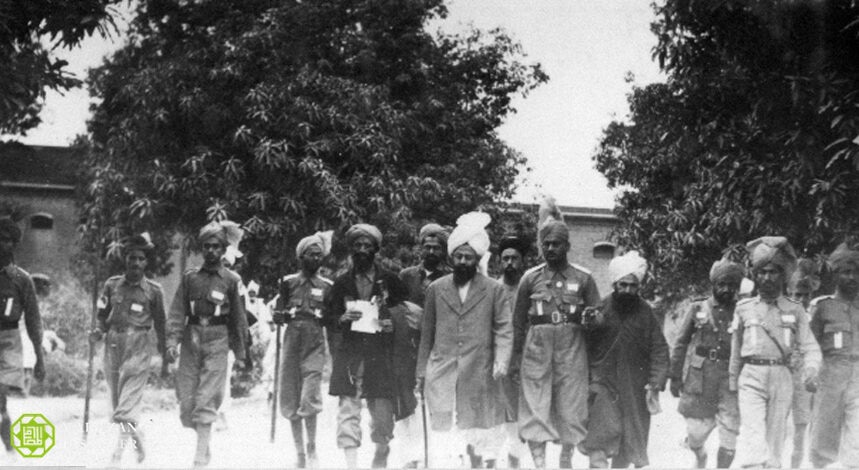
While commenting on a question over whether India politically deserved independence, Huzoorra said two core reasons proved India deserved complete independence: Past service to British Empire and capability. Huzoorra said Indians provided soldiers and served the British Empire in fighting for them during World War I. With regard to its capability, Huzoorra said it was wrong to consider the Indians undeserving just because they were not as educated, compared to Europeans, at the time. Indians might have been unable to govern other countries, but they were certainly capable of governing their own country.
Further, Huzoorra mentioned the discrimination and oppression faced by the Muslims from the Hindus. He stated that the level of discrimination from the Hindus has reached to such an extent that now they do not even rent a house to the Muslims. This segregation is not only limited to the houses, but also in the matters of properties as well, and organised efforts are being made to snatch the properties from the Muslims and bring them under the occupation of Hindus. Their main purpose of illegally occupying the properties is not to attain financial benefit, instead it is to weaken the Muslims.
Huzoorra said:
“In the matter of government services also this segregation policy is in full swing. No effort is spared to deprive Muslims of their due rights. All departments are Hindu-ridden. The reason assigned for the paucity of Muslims in the services is want of suitable men among them. But the fact is that Muslim candidates are rejected on the made up excuse of incompetence. It sometimes happens that a Muslim candidate applies for a post; but his application is torn to pieces and thrown into the waste-paper basket and he is merely told that there is no vacancy, while on the same day or the next one a Hindu candidate comes and meets with a ready response.” (Some Suggestions for the Solution of the Indian Problem [1930], p. 80)
Huzoorra added that in some Hindu-majority states, the preaching of Islam was also prohibited:
“A still greater hardship and tyranny has recently been devised i.e. some Hindu states have in a way forbidden the preaching of Islam. It has been laid down that no one can change his religion unless he gets a proper permit from a regular court where he has to present himself in person. The result is that a Muslim can easily be permitted to turn a Hindu while a Hindu will never get a permit for his conversion to Islam. In the case of a Hindu desiring to embrace Islam a long investigation is held and all those who have helped in imbuing the man with Muslim ideas are dragged into the court and somehow or other put to great inconvenience and embarrassment and the candidate himself has sometimes to suffer the rigours of imprisonment under false charges, so much so that he begins to doubt whether any God existed to watch the affairs of that part of the world.” (Ibid., p. 88)
Huzoorra said that the rights demanded by the minorities of India were not against the constitutional rights which had been accepted in different “civilised” countries. Thus, such demands could not be neglected, instead needed to be included in the future constitution of India.
After this, Huzoorra elaborated on the future constitution of India. He said that the protection of the rights of minorities and provinces must be kept in mind while drafting the future constitution. The Simon Commission had suggested a federal system of government in India, and considering the circumstances of India, this was the most suitable suggestion.
Huzoorra elaborated:
“In conformity with the Montford Scheme, the members of the Simon Commission have recommended Federal form of Government for India and in my opinion this is the most important recommendation that they have made, a recommendation that outdoes that of the Montford Scheme is that the latter has put forward a worked-out plan which bids fair to become truly federal whereas the former though recommending the federal form as a goal suggested no detailed scheme conforming to the principles of federation. The Simon Report not only deals with the scheme in its various stages, but has also tried though not effectively to adhere to the principles of federation throughout.
“In fact none acquainted with India can make any other recommendation, India is not a country, it is a subcontinent, the inhabitants of different parts of which are now slowly awakening to a national consciousness which however is not strong enough to justify a unitary form of government. Secondly India does not possess any common language, every province having a language or languages of its own. This difference is too great to be ignored. Again there is a good deal of racial difference. The Hindu of the North is radically different from that of the South. Peoples of the South claim to possess a civilisation older than that [of] the Vedic and even assert that the Vedic teaching is based upon their Tantras.
“Against this the Hindus of the North not only extol the Vedas above all other religious books but they claim their production in the very beginning of the creation thus anti-dating their civilisation to that of any other nation. Then there is the difference of creed and religion. Hinduism though quite strong in the North, Islamic civilisation has produced a sufficiently deep impression in these parts, but in Central India Hinduism reigns supreme. The South, though Hindu in religion, yet what one meets with everywhere is the Dravidian civilisation which in spite of the crushing pressure of the Brahmin has preserved its identity and is ever ready to assert itself. There is then the difference of character. […] In India the differences are so great that what is needed for the local needs of one part of the country is quite unsuited to those of the other.
“No one set of laws will equally fit all provinces nor can it be a means of promoting peace and prosperity. On the top of all comes the question of the native states who are at present under a sort of semi-independent personal rule. If India wants to progress some provisions will have to be made for the inclusion of the states within the constitution, but without affecting their autonomous position for no state would consent to lose its independence. Under the circumstances if any scheme can work out successfully it is the Federal form of Government and coming as it does from the Simon Commission it assumes a very great importance.” (Ibid., pp. 186-189)
Huzoorra added that a question arised as to what extent the Simon Commission wished to give Indians a federal style government. In this regard, Huzoorra said, its proposals were very ambiguous.
Huzoorra then commented on the point of separate electorates. He stated that this question had become the most important one during the ongoing politics of India.
Hazrat Musleh-e-Maudra said the Simon Commission had not considered the reality that both separate electorates and joint electorates had varying affects in different circumstances. Under the current circumstances, the right of separate electorates should have been given, but for a limited time period of around 25 years.
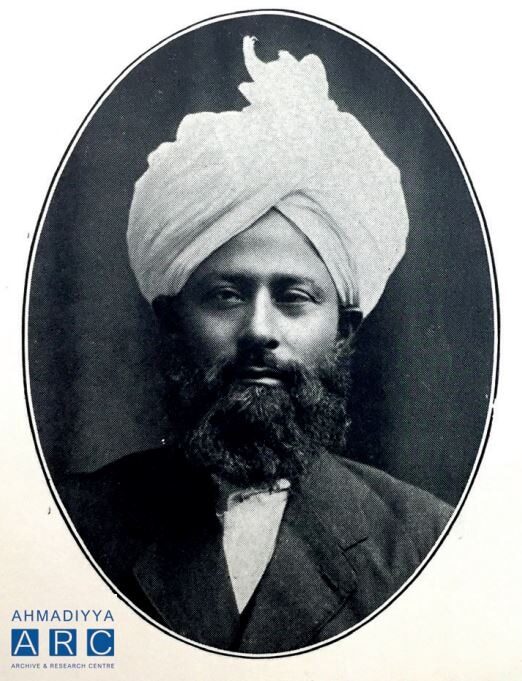
The Simon Commission had stated in its report that in India, one of the reasons behind the number of women being less than men was the purdah (veil) which impacted women’s health and eventually they died. Huzoorra said:
“Now I take up the question of Franchise. But as I intend to deal with only that aspect of this question which is connected with female suffrage, I have coupled with the question of franchise that of women’s suffrage as well. I regret to say in this connection that the Commissioners have been very unscrupulous in judging this question. They have raised a question which it was no business of theirs to raise, i.e. they have made an attack on the religion of Muslims.
“Sir John Simon and his colleagues cannot be unaware of the fact that the observance of purdah is an Islamic injunction, and to write anything against it is to make a direct attack on Islam. There is no denying the fact that everyone is at liberty to hold whatever view he pleases, and Islam surpasses all other religions in teaching toleration in this respect. If Sir John Simon had written a religious book, I would have regarded his views with respect and would have weighed the soundness or otherwise of his arguments. But Sir John Simon was writing the Royal Commission Report and therefore he should have abstained from religious matters. He repeatedly holds purdah to be responsible for many evils. For instance, he says, on p. 50, Vol. 1 of his Report:—
“‘The gap is at its widest in the age groups 10 to 20, and may not be unconnected with social customs and practices such as purdah and early marriage and unskilful midwifery which seriously affect the vitality of so many Indian women.’
“Again on p. 52, Vol. 1:
“‘As long as the destiny of a little girl is child marriage and seclusion of purdah there is no public opinion and no parents ambitiou to urge that daughters should have their opportunities of good education.’ […]
“I now turn to a refutation of the views expressed by the members of the Commission with regard to the purdah. Firstly, the Commissioners attribute the excess of males over females in India to the observance of purdah, it is indeed a strange inference! Purdah, it is said, impairs the health of the females, and consequently there is heavier mortality among the females than among the males. But how will they account for the disparity between the number of males and females in England which is much more marked than that in India, the only difference being that in England the females exceed the males while in India the males exceed the females.
“Can anyone hold with any show of reason that males in England are subjected to some tyrannical treatment which has resulted in shortening the lives of males more than the females? If the Simon Commission had taken the trouble to compare the population statistics of different countries, they would have discovered that the disparity in the numbers of males and females is governed by certain laws of nature, which are so subtle that the Simon Commission could not know much about them. […]
“The members of the Simon Commission have made another mistake in their judgment. They have not taken into consideration the fact that the deficiency in the number of females is most marked in the Sikh population and among the hill tribes; and both of these peoples are extremely opposed to purdah. […]
“Now I turn to the effect of purdah on health and education. It must be remembered that purdah has been practised among the Muslims from the earliest times, but in spite of this Muslim women have been taking part in all the spheres of administration. Muslim women have ruled over countries; they have served in armies; they have held the offices of judges and they have worked as professors. It should also be remembered that purdah observing Muslim ladies have acted in all these capacities which require the exercise of both strength and knowledge, at a time when all the other women who knew no purdah were more non-entities in both these respects. This shows that it is not purdah but other causes which are responsible for the present backwardness and ignorance of the Muslim women.
“I am at a loss to understand why purdah is looked upon as a hindrance to education. The Ahmadiyya Community, by the grace of God, believes in the Islamic purdah, yet female education is more advanced in the Ahmadiyya Community than in any other community in India. […]
“In short, purdah is an Islamic institution. If some Muslims deny it or abandon it under western influence, that is a different thing, but there is no doubt at all as to its being an Islamic institution. Even the wives of the Holy Prophet (may peace and the blessings of God be upon him) used to observe purdah, and they observed it at a time when Muslim power was fully established and when there was no danger of any insult or affront being offered to them. We have moreover a firm conviction that the tide will one day turn in favour of this misused and misunderstood institution of Islam, just as it has already turned in favour of divorce, prohibition of wine and the rights of women to property.” (Ibid., pp. 316-326)
Huzoorra also commented on proposed judiciary system, and outlined valuable guidance for matters such as the appointment of judges.
At the end, while addressing the representatives of the Round Table Conference, members of parliament and other dignitaries, Huzoorra stated that they should fulfil their responsibility without any kind of prejudice or discrimination, so that the future generations would remember them in good words:
“In the end I wish to address an appeal to all the delegates of the Round Table Conference, Members of Parliament and to other influential individuals both in England and in India. God has placed a tremendous responsibility on their shoulders. It is up to them to discharge this responsibility in an unbiased and a non-partisan spirit, so, that posterity may remember their names with honour; the prayers of generations deriving happiness from these decisions may reach them in all time to come; and above all they may become deserving of the grace of God.
“Selfishness is bad even in small and transient matters but it will be all an act of monstrous cruelty to allow one’s judgment to be warped by selfish motives and by thoughts of worldly gain in a matter which concerns millions of God’s creatures and the effects of which may last for thousands of years.
“May God through His great mercy, grant you sincerity of purpose, ennoble your intentions and clarify your perception! May this gathering and the momentous decisions which are to come out of it establish real unity and concord between India and England and between Hindus and Muslims, so that we may discharge worthily our responsibilities both to our contemporaries and to our posterity, and by the time we depart from this world we may have the satisfaction of seeing that since the day that we came into it, the world has traversed a long distance in the path of peace and love! Amen”
“And my last words are that all praise belongs to Allah the Lord of the Universe.” (Ibid., pp. 458-459)
Related Content
- Hazrat Musleh-e-Maud’s services to the Muslim cause: Guiding Muslims of the Indian subcontinent amid religious and political conflicts
- Hazrat Musleh-e-Maud’s response to the Shuddhi movement and the Jamaat’s relentless services for Islam
- Freedom is the birthright of everyone: Hazrat Musleh-e-Maud’s guidance regarding India’s independence and partition
- The Wavell Plan and Hazrat Musleh-e-Maud’s call for peace and India’s freedom
- The Simla Conference, 1945: Hazrat Mirza Bashiruddin Mahmud Ahmad’s (ra) guidance prior to the conference and response to its failure
- The Cabinet Mission, 1946: Its background and Hazrat Mirza Bashiruddin Mahmud Ahmad’s (ra) guidance
- The deadlock over Interim Government and Constituent Assembly for India: Its background and Hazrat Mirza Bashiruddin Mahmud Ahmad’s (ra) guidance
- May India and Pakistan live amicably: The Partition of India, 1947 and Hazrat Mirza Bashiruddin Mahmud Ahmad’s heartfelt wish

